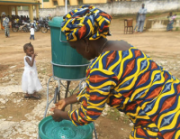How is CAFOD responding to Ebola?

CAFOD handwash facility - Guinea
CAFOD Church and non-Church partners are urgently scaling up their response to the Ebola crisis, and need to reach many more people over the coming weeks. Their work includes:
Raising awareness: Many communities do not have access to accurate information on Ebola, or hygiene facilities to protect themselves. Our partners are working with priests and imams to spread the word about hand-washing and safe sanitation, and to distribute hygiene kits. Religious leaders are in a unique position to bust myths and ensure that communities take the right action to prevent the spread of the disease.
Providing safe burials: Ebola can spread through contact with the bodies of people who have died from the disease. CAFOD church partners and faith leaders in affected communities are best placed to work with in making sure that communities understand the stringent procedures that need to be adhered to pre and post funerals. We will be supporting partners to promote and provide safe burials in Northern Sierra Leone.
Supplying food: As the spread of Ebola widens, the day to day task of buying or stocking food is becoming more challenging. Farmers have been unable to work together to harvest their crops, prices have risen, and food is becoming scarce in districts that have been quarantined. We are supporting Church partners in Liberia to provide vulnerable families with food, and plan to scale up this work into Sierra Leone.
What effect is Ebola having on society in general?
The outbreak is affecting the rest of the health system, as resources are diverted to treat patients, leaving clinics and hospitals unable to administer general healthcare, and having to close. Our partners tell us that because of restrictions of cross border imports of produce, and members of farming communities being affected by the disease, food is becoming scarce in some places, which has lead to prices increasing beyond the reach of ordinary people.
Where has Ebola hit this year?
The deadliest outbreak of the Ebola virus in recorded history has spread across Sierra Leone, Liberia and Guinea. There is uncertainty about how many people have Ebola, the ones that World Health Organisation (WHO) numbers stand at more than 10,000 people infected, this is made up of confirmed, suspected and probable cases. WHO confirm that 4,992 people across Sierra Leone, Liberia and Guinea have died from the Ebola virus.
WHO now estimate that if rapid action is not taken to halt the spread of the virus in the coming weeks, there could be up to 10,000 infections per week.
What is Ebola?
Ebola virus disease is a severe acute viral illness often characterised by the sudden onset of fever, intense weakness, muscle pain, headache and sore throat. This is followed by vomiting, diarrhoea, rash, impaired kidney and liver function, and in some cases, both internal and external bleeding.
Ebola first emerged in the Democratic Republic of Congo in 1976, and until the current crisis began in 2014 in West Africa, the disease had killed around 2,000 people in a number of separate outbreaks. It is thought to infect humans through contact with infected animals, including chimpanzees, fruit bats and forest antelope. It can then spread between humans via bodily fluids.
People who are infected with the current strain of Ebola on average have only a 30 per cent chance of survival - in many cases less, given the low levels of health services available in the rural areas of West Africa where it has hit. There is no vaccine and no known cure, although tests for vaccines and treatment options are underway. The most commonly used treatment is to keep the patient hydrated, as is the case with most fevers. Patients have a better chance of survival if they are diagnosed early and receive early treatment.
How is Ebola transmitted?
The virus is transmitted between humans via bodily fluids, and via surfaces that a sick person has come into contact with – for example, bed sheets or shared towels. Even funeral ceremonies for Ebola victims can cause risks, if mourners have direct contact with the bodies of infected people.
By following a few important procedures, the spread of Ebola can usually be stopped relatively easily. Patients need to be kept in isolation, and their nurses or visitors must wear protective suits or avoid coming into direct contact with them.
One reason that the virus has spread so extensively in West Africa is a widespread fear and lack of trust in the advice given on Ebola prevention. Many people don’t have access to reliable information, and high death rates and stigmatisation make people afraid to take their loved ones to hospitals, even if medical facilities are available.
How are CAFOD partners able to move about safely?
CAFOD's local partners are mainly based in the affected communities, and are known and trusted by community members. They still need to travel by road to reach communities that we are supporting, but they are familiar with the terrain. During the Ebola outbreak, quarantine restrictions have placed further constraints on communities wanting to get to market to buy or sell produce.
CAFOD partners delivering aid have permission to cross quarantine zones to support affected communities, and will be following strict guidelines on how best to deliver aid or prevention information that minimises exposure to risk of infection.
What effect is Ebola having on society in general?
The outbreak is affecting the rest of the health system, as resources are diverted to treat patients, leaving clinics and hospitals unable to administer general healthcare, and having to close. Our partners tell us that because of restrictions of cross border imports of produce, and members of farming communities being affected by the disease, food is becoming scarce in some places, which has lead to prices increasing beyond the reach of ordinary people.
People are not encouraged to gather in crowds – especially for aid distribution – so how is aid being distributed?
There are other ways to conduct distributions and minimise risk. Where it’s safe and markets are functioning, it’s more effective to provide people with cash or vouchers so that they can choose what they need in the market, in their own time.
If distributions are required, smaller groups can be gathered on different days, or house to house distributions can be conducted.
CAFOD’s partners take care to minimise gatherings of people to limit risks of exposure to infection, in line with Ministry of Health and WHO recommendations.
Is the Ebola virus affecting CAFOD’s existing work in West Africa?
The crisis has a regional dimension as Ebola significantly impacts on the entire West-African economy, and particularly the poorest communities. The underlying causes and rapid spread of the disease are not just medical, but also have political, economic and security dimensions. The effects are felt at all levels - local, national, regional and global.
Many parts of Sierra Leone, Guinea and Liberia are affected by Ebola, and all the communities we work with have been affected or are at risk. We are monitoring our programmes closely, continuing to support existing livelihoods programmes where these are still viable, and taking careful measures to make sure that all our staff are protected, by ensuring that they comply with stringent health and safety protocols. We are also in constant communication with our partners to ensure we meet their needs as they undertake lifesaving work.
How long has CAFOD worked in Sierra Leone and Liberia?
CAFOD has a long history of working in both Sierra Leone and Liberia, in times of peace, war and rebuilding, over the last 30 years or so.
With support from the Catholic community of England and Wales we’ve worked together to respond to the civil war in both countries during the 1990s, and more recently during our Lenten season supporters raised money to support inspired food projects in Kenema, Sierra Leone, one of the hardest hit areas affected by the Ebola outbreak.
Because of that history and our well established partnerships we are able to respond to the Ebola crisis through the network of church partners across dioceses in both countries, who are on the frontline providing life saving prevention information, hygiene kits, and where needed food to quarantined and vulnerable families.
We remain constantly in touch with our partners who tell us what the greatest needs on the ground are in responding to the Ebola crisis.
To support CAFOD's Ebola crisis appeal see: https://cafod.secure.force.com/donate/?id=701C00000015FlxIAE


















